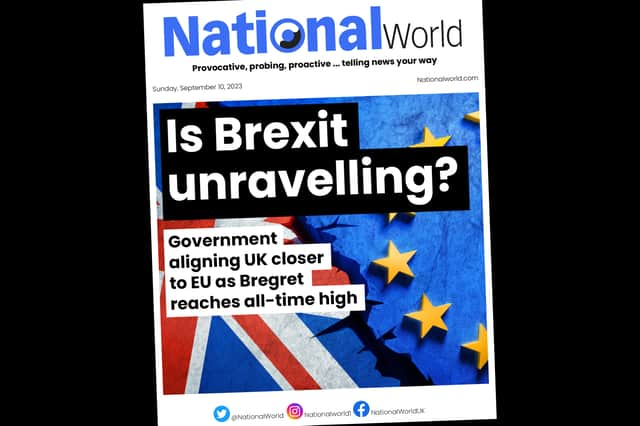Rishi Sunak won't admit it, but government policies show Brexit is bad for business
and live on Freeview channel 276
People wouldn’t have noticed a change - because there wasn’t one - the price of imported peppers, tomatoes and potatoes just didn’t suddenly shoot up.
That’s because now, seven years after the UK voted to leave the EU and three-and-half years after Brexit actually took place, there are still no additional checks or tariffs on food exported from Europe to Britain.
Advertisement
Hide AdAdvertisement
Hide AdLast month, the government chose to delay bringing in these checks for the fifth time. They’re now scheduled to be incrementally introduced during 2024, and we can only wait and see whether they’ll be delayed again.
So effectively, European farmers can still export food and produce to Britain without slow inspections of cargo and reams of paperwork, just like when the UK was in the EU. Another recent change, British businesses will keep using the European CE safety mark instead of a UK-only one, due to costs going up.
And just this week, the government announced we’ll be rejoining the £85 billion EU Horizon scientific funding programme, instead of creating a UK-only version called Pioneer. It’s almost as if being part of the world’s biggest single trading bloc was beneficial to UK businesses and our people.


But why is Brexit-supporting Rishi Sunak doing this? Well on the food front, the government has said it’s concerned about inflation and food prices rising. The UK’s food security - which means the proportion of food that we eat which is produced by our own farmers - currently sits at 60%, so if we only ate British food this year we would have run out on 9 August.
Advertisement
Hide AdAdvertisement
Hide AdIt has previously been lower, however the National Farmers Union is concerned about it as countries become more protectionist over their food and climate change impacts supply chains. As a result, despite leaving the EU, we actually imported record amounts of food from Europe last year, £34 billion worth between January and October 2022 - which was 15% higher than the year before.
And when these checks come in, the cost of that food for consumers will doubtless increase. While the government says the delay is to prevent inflation, some farmers think it’s actually because the government is worried about running out of food.
Liz Webster, of the Save British Farming campaign, told me: “If they apply checks for EU imports, most EU exporters will give up exporting their much loved produce to the UK. Far from taking back control, we’re opening ourselves up to anybody buying low quality meat at the market.
"They've delayed these food import checks because they're inflationary, but also because it will affect supply. If they put the checks in, all of the EU exporters will have not bothered to send anything here."
Advertisement
Hide AdAdvertisement
Hide AdClearly there were some good things about having this kind of alignment with the EU, otherwise the UK would have brought in the food checks straight away. And by delaying this again over inflation, the government is tacitly admitting that Brexit is effectively bad for business.
Rishi Sunak could have boldly proclaimed that he was bringing in the food checks so Britain could take back control, but instead he’s focusing on the economy - which he's basically admitting is helped by close alignment with the EU.
Another stealth admission comes in the form of keeping the European CE safety mark, which has been used in this country for decades. After Brexit the government brought in the country's own UKCA mark (UK Conformity Assessed). However, last month, the Department for Business and Trade announced it would retain the EU safety mark indefinitely, after business had complained it would drive up costs.
And just this week, the government announced the UK was rejoining the Horizon programme, much to the relief of scientists, who have lost out a billion pounds of funding a year according to Labour analysis.
Advertisement
Hide AdAdvertisement
Hide AdThe government had spent a lot of time touting the UK-only Pioneer scheme, but when push came to shove it looks like Rishi Sunak decided we were better together, just like with the CE mark.
And politically, the timing is interesting, with Bregret - Brexit regret - at its highest level since the EU referendum. According to YouGov, 57% of voters believe Brexit was a mistake while just 32% thought Brexit was the correct decision, and YouGov also found a majority of voters, 51%, now want to rejoin the EU.
Judging by the government’s policies Rishi Sunak could be one of those people having Bregret.
Comment Guidelines
National World encourages reader discussion on our stories. User feedback, insights and back-and-forth exchanges add a rich layer of context to reporting. Please review our Community Guidelines before commenting.
